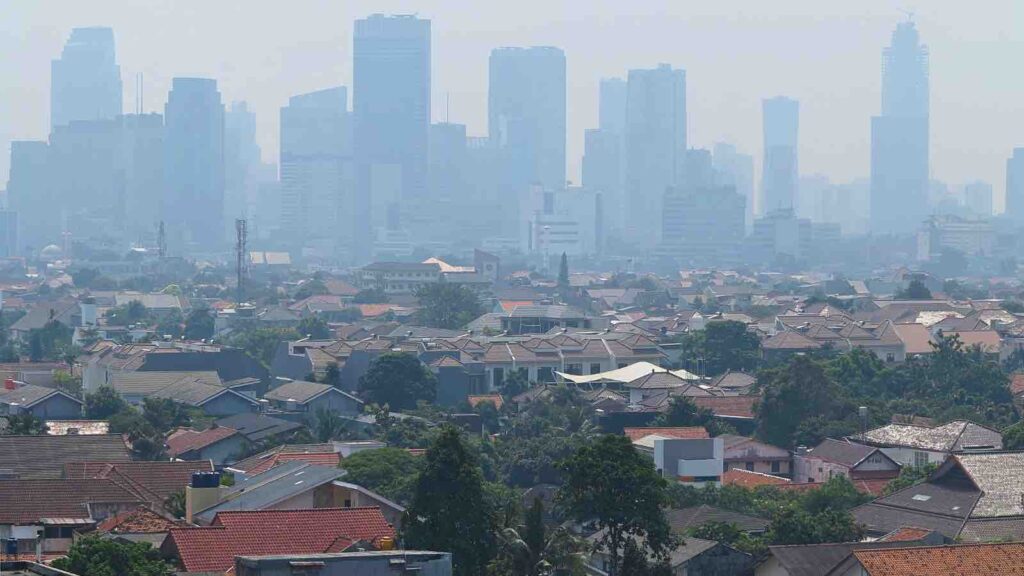Data collected by KPBB from 2017 to 2023 shows that the annual average concentration of PM2.5—a key pollutant—ranged from 38 to 46.1 µg/m3, levels categorized as unhealthy.
JAKARTA — Jakarta’s air quality has consistently remained unhealthy for the past seven years, leading to a surge in medical costs related to respiratory diseases. The Komite Penghapusan Bensin Bertimbal (KPBB), an organization dedicated to eliminating leaded gasoline, highlights that the lack of Euro 4 standard fuel is a major factor in controlling emissions from vehicles, a primary source of air pollution in the capital.
RELEVANT SUSTAINABLE GOALS



A Growing Health Crisis
According to Ahmad Safrudin, Executive Director of KPBB, emissions from vehicles continue to be a major threat to air quality in Jakarta and surrounding areas. The pollution not only affects public health, particularly children, but also drives up medical costs, contributes to physical and mental health issues, and threatens Indonesia’s demographic dividend.
Data collected by KPBB from 2017 to 2023 shows that the annual average concentration of PM2.5—a key pollutant—ranged from 38 to 46.1 µg/m3, levels categorized as unhealthy. Safrudin pointed to emissions from motor vehicles, industries, open waste burning, construction activities, and coal-fired power plants as primary contributors to the poor air quality.
“Air pollution from these sources has severe health impacts, including increased medical expenses,” Safrudin noted. According to the United Nations Environment Program, medical costs related to respiratory health in Jakarta reached Rp 51.2 trillion in 2016 alone.
The Role of Vehicle Emissions
Motor vehicles are the largest contributors to urban air pollution in Jakarta. KPBB data from 2019 revealed that PM10 emissions in the Greater Jakarta area (Jabodetabek) totaled 14.88 million tons per year, with transportation accounting for 47%, followed by industry (20.24%), households (11%), road dust (11%), waste burning (5%), and construction (4%). For PM2.5 emissions, the figures were even starker, with 57% coming from transportation.
“These emission burdens are expected to keep rising,” said Safrudin. He emphasized the need for lower sulfur fuels, noting that fossil-fuel-powered vehicles are the main source of air pollution in urban areas.
The Push for Euro 4 Standards
Indonesia’s reliance on outdated automotive technology and dirty fuels has also impacted its global competitiveness. While many countries have adopted Euro 4 vehicle standards and cleaner fuels, Indonesia continues to use older technologies that do not meet international emission regulations. This has resulted in increased imports of “dirty” fuels—17.09 million kiloliters of gasoline and 5.59 million kiloliters of diesel in 2023.
Safrudin stressed the importance of enforcing the Ministry of Environment and Forestry Regulation No. 20 of 2017, which sets emission standards for motor vehicles, as a critical step in air pollution control. “We need to support the government in consistently supplying Euro 4 compliant fuels to meet the technological requirements for vehicle emissions control,” he said.
Government’s Struggle with Dirty Fuel Imports
Despite Indonesia’s regulatory commitments, the country continues to face challenges in phasing out dirty fuel imports. Ahmad Safrudin criticized the government’s inability to curb the influx of non-compliant fuels from countries that have moved beyond Euro 4 standards, such as Thailand, Malaysia, Vietnam, and China.
“Indonesia, despite having regulations in place, remains powerless against the flood of dirty fuel imports,” Safrudin lamented, highlighting the political and economic influences that sustain these imports. He attributed the government’s indecisiveness to an “invisible hand” of political forces linked to oil traders.
The Need for National Action
Safrudin called on the Coordinating Minister for Maritime Affairs and Investment, who leads the task force on air pollution control in Greater Jakarta, to prioritize the provision of Euro 4 standard fuels. He stressed that, despite the adoption of Euro 4 regulations since 2018, the implementation has been hindered by inadequate fuel supply.
“Seven years after the adoption of these regulations, the consistent supply of compliant fuel remains a challenge,” said Safrudin. He pointed to the need for government intervention to ensure that fuel imports meet Euro 4 standards, which would not only improve air quality but also create fiscal space and reduce the economic impact on the nation.
The Broader Implications
The issue extends beyond environmental concerns, affecting public health, economic stability, and social well-being. The high levels of emissions, particularly PM10 and PM2.5, are expected to continue rising unless comprehensive measures are taken. Safrudin urged the government to prioritize environmental sustainability by enforcing stricter regulations on fuel quality and emissions.
“Consistent supply of Euro 4 compliant fuel is essential for controlling air pollution,” Safrudin reiterated. He advocated for the alignment of fuel policies with global standards to reduce the burden of air pollution on public health and the economy.
Lead image courtesy of Cris Andrei from Getty Images (Jakarta Skyline)
You may also be interested in :
Right To Clean Air: 5 Strategic Actions For Cities To Ensure Everyone Breathe Clean Air






This Post Has One Comment
So cool
Comments are closed.